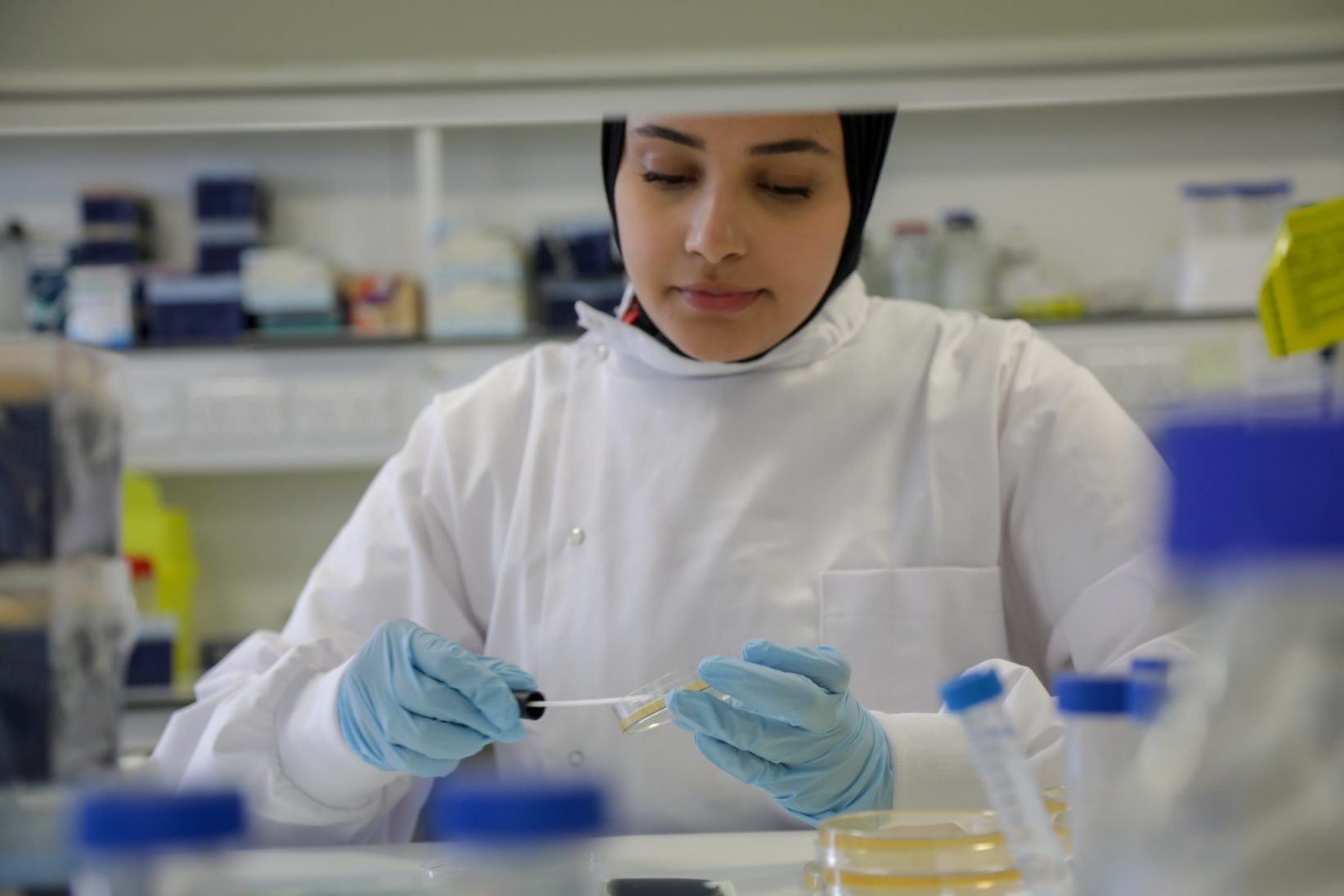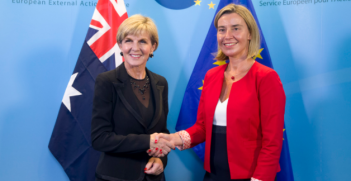The Spread of Antimicrobial Resistance May Become More Disruptive to Global Trade Than Brexit or Populism

An important aspect of Brexit is how it will affect Australia’s trade relationship with that region. One often-overlooked aspect is how trade will affect the spread of antimicrobial resistance.
With much yet to play out in the UK’s Brexit process, assessing how the EU’s Single Market harmonisation policies can be maintained between the UK and its EU partners will take some time. Another important trade agenda being negotiated – antimicrobial resistance in the international food chain – could be potentially more disruptive for trade.
In the meantime, Australia is politically balancing some competing interests as it sensitively navigates the UK’s enthusiasm for rediscovering trade opportunities with its Commonwealth partners while simultaneously actively negotiating a Free Trade Agreement (FTA) with the European Union (EU), which still includes the UK. Few are yet aware that the EU’s FTA negotiating text has nudged Australia to acknowledge that antimicrobial resistance (AMR) is also a trade issue. The media and many politicians have yet to recognise this connection.
Australia-EU Free Trade Treaty Negotiations – A Challenge for DFAT’s FTA Model?
Another important point to note about the Australia-EU FTA is that it will set new negotiating parameters and be a novel experience for Australia’s trade bureaucrats to navigate. The EU negotiating framework represents changes in emphasis from the standard Australia/US FTA template that has informed and underpinned the plethora of FTAs Australia already agreed. And Australia’s industry sectors will have to contend with a set of trade priorities and regulatory structures more sensitised to consumer preferences.
The EU’s more transparent trade negotiating framework should be welcomed by NGOs, consumer and public health advocates generally unsuccessful in accessing or influencing Australia’s FTA negotiating texts. The EU’s standards for food safety, sustainability, environment, testing and regulatory frameworks, privacy and transparency commitments offer higher protections for consumer interests and rights. Australian NGOs may collaborate/lobby with EU consumer groups on issues of mutual concern.
Importantly, the EU is excluding the highly politically contested Investor State Dispute Settlement Agreement (ISDS) a position strongly supported by many including the Labor Party (which has been highly criticised for endorsing FTAs containing ISDS). The corporate sector will be disappointed at losing this option which allows them to effectively override national sovereignty.
The traditionally supportive food production industry will also face some negative consequences. The EU’s claims over specific geographic indicators (GIs) (indicators of the geographic origin of food) could impact trademarks and branding strategies of some important food and beverage industries. Australia’s interpretation of the WTO’s Agreement on Trade Related Aspects of Intellectual Property Rights (TRIPS) currently underpin industries’ use of generic names, such as gruyere, roquefort, kalamata and some spirits. Australia has already signalled GIs will be included in negotiations.
Politicians are likely to find unusual levels of resistance from industry, particularly as compromise positions evolve on which GIs might form part of the FTA bargaining process. This will make for interesting media headlines. The EU’s proposed text on Intellectual Property addresses how the Australia-EU FTA should implement governance of geographic indicators and provides the list of EU geographical indicators (GIs) for negotiation.
The New FTA Agenda – Antimicrobial Resistance in the Food Chain
Simply put, this new agenda relates to the overuse and misuse of antimicrobials (antibiotics, antifungals etc) in food production directly and indirectly contributing to the development and spread of antimicrobial resistance (AMR). The EU now systematically includes AMR as a health and food security issue in the Sanitary and Phytosanitary negotiating template.
The EU’s inclusion of AMR in trade policy could be challenging for food producers but should be supported by public health experts as AMR in the food chain presents significant risks to humans. For the first time, Australia’s trade negotiators will be required to transparently acknowledge the importance of addressing antimicrobial resistance in a trade agreement.
Setting the Trade Framework for AMR – The EU’s Leadership Role
The EU’s Directive 2003/74/EC imposed import restrictions on meat where antibiotic growth promoters were used. It is now set to extend this ban through a comprehensive set of policy interventions and legally enforceable trade rules agreed to and ready to be brought into force. Its public health/trade objectives include safeguarding essential antibiotics for human use and maintaining a level playing field for its farmers.
The EU has systematically harmonised its AMR governance framework but substantive implementation gaps will delay fully enacting its directives. Nevertheless, it has already mainstreamed ongoing AMR dialogue into its FTAs. The EU also actively participates in the international food safety body – the Codex Alimentarius Commission negotiations which feeds into the WTO and SPS obligations facilitating global food trade.
The Multilateral Agenda – Codex and the WTO: Governance of Food Safety:
The international food standard setting body, Codex Alimentarius Commission, reconvened its Intergovernmental Taskforce on AMR (TFAMR) in 2016 to specifically address AMR in the food chain. But this taskforce is now having to deal with substantive political issues as negotiators try to navigate differing developed/ developing food production issues as well as some deep divisions between the EU and the US regulatory approach to AMR, food safety, and trade. The next negotiations in December may prove equally as difficult.
The new measures in the EU regulatory pipeline include: commitments to avoid routine prophylactic and metaphylactic use (disease prevention); banning the use of antimicrobials in animals for growth promotion or yield increase; and importantly, reserving certain antimicrobials for treatment of infections in humans only (specifically, antibiotics from WHO List of Critical Antimicrobials). The EU intends for these measures to be compatible with all international agreements, including WTO national treatment obligations.
The EU’s approach to implementing trade policy measures (i.e. import restrictions) was not contested in the TFAMR. However, comments made in the WTO SPS Committee demonstrates the highly political nature of AMR food safety measures such as import restrictions and testing of food imports.
Australia, responding to the EU’s statement to the WTO SPS meeting, is contained at Section IV 1.21 is of interest. It included registering “…concern that any measures to restrict access to the prophylactic use of antimicrobial in food animals would have significant adverse impact on exports of Australian and other livestock animal products.” This is a strong statement that will have been noted given Australia is a major food producer and exporter and would be seen as joining in with other countries critical of the EU’s intentions to address prophylactic use of antimicrobials contributing to AMR.
AMR One Health Strategies: Trade Policy Cohesion Gap
In general, the operations of Codex and the WTO are not understood by the broader community, nor unfortunately by many politicians and policy experts responsible for implementing AMR One Health Strategies. Codex defines food safety and its decisions relevant in SPS actions and WTO dispute provisions. Trade negotiators understand these subtle linkages, and the global spread of AMR is facilitated by “trade.”
The efforts made to reduce antibiotic use in the community are welcome, but without back-up diagnostics, can also be costly or dangerous and constitutes only one aspect of the larger AMR problem. Trade policy needs to be assessed through an AMR lens to ensure broader health security criterion is driving decision making. Like many others, Australia’s food chain is not yet regulated or tested for AMR microorganisms, be it domestically or in international imports. There are many issues yet to be understood and acted upon.
Some in the international financial markets are already well ahead of governments in responding to AMR in the food chain and these developments are filtering through the food industry, pressuring global restaurant chains. Also, asset managers have assessed AMR as a material risk across multiple sectors including food, pharmaceutical, healthcare, insurance industries and have factored in consumer preferences as well as the EU’s AMR health/trade policy. But broad political leadership is still needed to achieve fundamental change.
The Need For A Global Consensus to Mitigate AMR Transmission via Trade
The UK is acknowledged as a global leader in developing AMR policy direction. It established a strong national governance model with clear political direction from an All Party Parliamentary Group, AMR is defined as a Tier One National Security Threat and funds significant AMR development assistance. The UK’s leadership also serves to bolster the EU’s negotiating position in international forums on trade strategies to address AMR, particularly as negotiations are reaching a critical stage.
The UK election in December may result in the UK being tied into FTA negotiations with the EU for some considerable time if the current Brexit deal is approved. But if the UK leaves the EU without a deal, it will urgently seek a quick FTA win with Australia. But in such crisis conditions, the UK may choose to avoid any FTA provisions that could upset the US. A possible scenario could be for the UK to negotiate an FTA with Australia that mimics the AUSFTA framework, adds an ISDS provision, and avoids including the EU’s AMR Trade provisions. Given current US/EU FTA tensions, this scenario would involve Australia making a choice to risk damaging relations with the EU for very little gain.
Anna George is a former Australian ambassador, adjunct professor at the Sir Walter Murdoch School of Public Policy and International Affairs at Murdoch University, and associate fellow at the Centre on Global Health Security, Chatham House.
For those interested in international negotiations, this article provides a background to much of the analysis made in this current article and explains the negotiating process, and provides case studies of the outstanding and sensitive issues.
This article is published under a Creative Commons Licence and may be republished with attribution.





